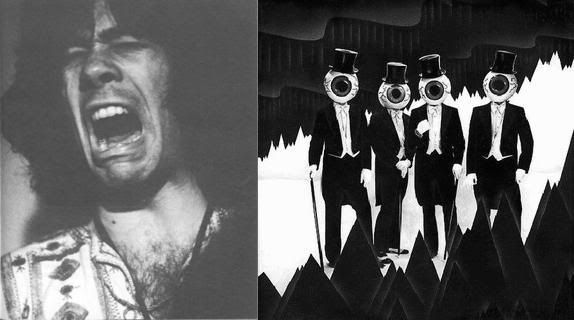A Question of Dates and Terminology
Printed From: Progarchives.com
Category: Progressive Music Lounges
Forum Name: Prog Bands, Artists and Genres Appreciation
Forum Description: Discuss specific prog bands and their members or a specific sub-genre
URL: http://www.progarchives.com/forum/forum_posts.asp?TID=32115
Printed Date: June 13 2025 at 16:22
Software Version: Web Wiz Forums 11.01 - http://www.webwizforums.com
Topic: A Question of Dates and Terminology
Posted By: The Whistler
Subject: A Question of Dates and Terminology
Date Posted: December 12 2006 at 02:50
|
Here's a good one: when did all these terms come into play? That is, when was it called "art rock" or "prog rock" or "progressive." Or jazz fusion. Or whatever. And who? Who said it? Was it the Who? They said "rock opera."
When, where, why and how did these terms evolve? Does anyone know?!? ------------- "There seem to be quite a large percentage of young American boys out there tonight. A long way from home, eh? Well so are we... Gotta stick together." -I. Anderson |
Replies:
Posted By: Dick Heath
Date Posted: December 12 2006 at 11:25
|
When, where, why and how did these terms evolve? Does anyone know?!? Remember rock is not such an ancient a term - Joe Boyd in his White Bicycles autobiog suggested 1964 for rock's introduction, when Dylan went electric at the Newport Jazz & Folk Festival? And for all the celebration of rock'n'roll's 50th anniversary last year, jumpin' jive and jitter bug sounds remarkably like R'n'R as early as 1943. However, Jive was more jazz-based while R'n'R a hybrid of blues and country. Jazz fusion: One of the first examples of the use of fusion was Joe Harriott/John Mayers Indo-jazz Double Quintet fusion group of 1965-7 - although I'm told the word fusion can be found as aprt of the title of an earlier album - I think by Pharoah Saunders. There was a brief use of rock jazz for bands 68-70 which related to pop rock bands using distinctively jazz-based solos, e.g. Nice, Timebox, BST. However, the rock jazz of BST and then This is my long term perspective on jazz rock fusion. However, the Jazz Britannia documentary BBC TV 4 ran early 2005, stated in programme 2 that jazz rock was being played in the early 60's in London by the young jazz and blues oriented musicians, e.g. Georgie Fame, Zoot Money, Graham Bond
- indeed it was suggested they were not allowed to play the
conventional jazz instruments (e.g. piano) in jazz clubs, because that
was for the established jazzers, hence with the influence of Jimmy Smith
etc. electric keys etc. for instance were played instead - interesting
thought wrt to amplification in jazz earlier than suggested above.
Further the programme suggest jazz fusion was being played in the Progressive music/progressive rock/prog. Once upon time rock appeared.
As musicians matured, got more proficient in playing their
instruments, got better music qualifications, wanted more
sophistication, listened to music other than pop, then they
were ready to play progressive music. And there was
a rather select audience waiting for it: an audience was the
money earning youth movement (often associated with
the underground movements in various centres around the
world, places to turn in drop out, e.g. swinging About six months ago, we had a similar debate which led to me checking my handful of clipping from 1967 to 1977 from Melody Maker, Rolling Stone magazines, etc. and not finding many references to progressive rock.
Further a websearch of those older progressive rock bands and
their archives with press clippings, and I think I found only one
reference to Jethro Tull (of several of the obvious bands) being progressive over a 6 year period 1968-74. Comment at that time: did progressive rock come into come parlance as a term of abuse made by the punk music writers around 1978???? I once asked about the earliest use of Art Rock,
and had one American swore that he had used the term as early as
1966 for the clever, more artistically adventurous pop/rock of
the period. In some respects art rock in UK, maybe traced back to those bands who formed whilst attending art college and would include bands as diverse as the Kinks or Bonzo Dog Do Dah Band or the Yardbirds (and could also include John Lennon!!!),
and then one might loosely suggest this to be middle class thing
amongst musicians who had a better education......clever lyrics (beyond
the moon in June, or love thing), arrangements beyond the basics of rock'n'roll*. By the early 70's art rock was part associated with dressing up/make-up and making more theatre out the music business - hence T Rex, Sweet, Bowie, Queen, Roxy Music were amongst the first wave, Be Bop Deluxe notable exception amongst the 2nd wave of art rock/pop of Gary Glitter/Glitterband or Mudd. Personally I think there is some difference between the *A
thought that strike me is that punk pundits keep talking about the raw
energy of rock'n'roll as an important element of their 3 or 4
chord music and the Kinks being often cited as influences - however, the Kinks
with their mid 60's sophistication were indicating where rock could go
(e.g. into prog): I would suggest that punk advocates want that
bit of that cake without having the tasty decoration, which we
prog fans enjoy. But consider: you can't have a prog musicians
without first those musician learning those first 3 or 4 chords and
playing rudimentary music.................. ------------- The best eclectic music on the Web,8-11pm BST/GMT THURS. CLICK ON: http://www.lborosu.org.uk/media/lcr/live.php - http://www.lborosu.org.uk/media/lcr/live.php Host by PA's Dick Heath. |
Posted By: salmacis
Date Posted: December 12 2006 at 15:55
|
Dick- I found some articles from around 1972 on a Phil Manzanera that clearly labelled King Crimson as a 'progressive rock band' and another one where it said Manzanera had 'jobbed around in progressive jazz rock bands' and mentioned the Canterbury clan in that article. Both were written by Nick Kent- like Charles Shaar Murray I don't think he was a champion of prog, either- and were quite early. Also, the King Crimson CD inlays had various mentions of them being a 'progressive' band, if not a full blown progressive rock label. I posted these but to general indifference on that 'a brief history of prog' thread a few weeks ago.
After 1978, I did find a few more mentions of 'progressive rock'- I have album reviews in CD liner covers of people like Twelfth Night, White Spirit (who aren't even prog anyway) where the term is used. |
Posted By: rileydog22
Date Posted: December 12 2006 at 21:05
|
I saw a section of an old interview with Fripp once that I now can't seem to find, and to paraphrase extremely it went along these lines: Interviewer: You're music is quite unique. How would you describe it? Fripp: Hmmm... Progressive. Yes, that's it! Progressive! Or something like that. But now I can't find it, so maybe that's wrong. -------------   |
Posted By: The Whistler
Date Posted: December 13 2006 at 01:59
|
Okay, the term was applied earlier than I suspected. I thought it was a later creation, but:
Prog was used in at least 1969.
Art rock was probably used sometime in the sixties.
Jazz fusion (or at least fusion) was used even earlier.
Righto. Thanks. ------------- "There seem to be quite a large percentage of young American boys out there tonight. A long way from home, eh? Well so are we... Gotta stick together." -I. Anderson |
Posted By: Atavachron
Date Posted: December 13 2006 at 04:06
| ...and I remember the terms 'art rock' and 'progressive rock' were often interspersed, at least by the general public. 'Progressive' was primarily a musician's word until the music press adopted it as a term of convenience and genre. |
Posted By: Dick Heath
Date Posted: December 13 2006 at 08:46
I doubt if the reduced form prog was used in the media and therefore generally until well after the late 60's. Progressive music would have been used by the pretentious - like me
Jazz fusion would have covered (and certain still does) jazz fused with music, both rock and non-rock. But if you think about it, Paul Whitman in the 20's was marrying jazz and serious music - didn't he commission Gershwin's Rhapsody In Blue? The original Whiteman arrangement is different from that played more commonly nowadays by classical orchestras; (an exception is on Simon Rattle's Jazz album, which goes back to the original Whitman arrangement). ------------- The best eclectic music on the Web,8-11pm BST/GMT THURS. CLICK ON: http://www.lborosu.org.uk/media/lcr/live.php - http://www.lborosu.org.uk/media/lcr/live.php Host by PA's Dick Heath. |
Posted By: The Whistler
Date Posted: December 15 2006 at 02:20
|
Well, I'm still talking about the terms. And I reduced it to prog right there for my convience, so... ------------- "There seem to be quite a large percentage of young American boys out there tonight. A long way from home, eh? Well so are we... Gotta stick together." -I. Anderson |
Posted By: Flip_Stone
Date Posted: January 04 2007 at 17:21
|
Hmmm...trying to put labels on music and get it to fit into pre-conceived boxes seems anti-prog. In other words, it is limiting and constricting, and not free and open like the very nature of prog. I don't understand why people worry about terminology. I rather enjoy music for what it is than stick it under the microscope and dissect it to death.
Just my opinion.
|
Posted By: Dick Heath
Date Posted: January 05 2007 at 08:24
Agree with you. However, problem comes when without the benefit of a recording, you have to verbally describe music to somebody - such tags are useful occasionally if used correctly. ------------- The best eclectic music on the Web,8-11pm BST/GMT THURS. CLICK ON: http://www.lborosu.org.uk/media/lcr/live.php - http://www.lborosu.org.uk/media/lcr/live.php Host by PA's Dick Heath. |
Posted By: oliverstoned
Date Posted: January 05 2007 at 08:34
In french progressive rock was first called "rock progressiste", word which usually has a political connotation. Then it turned to "progressif", but in english there's only one word for both. |
 The
Whistler wrote:
The
Whistler wrote: